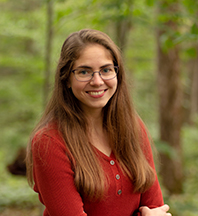Week of June 11, 2023 – June 17, 2023
by Bridget Jones, Environmental Educator
This week, smoke from the Canadian wildfires covered our region, transforming the world outside our windows. The fires have caused devastation and evacuations in Quebec and impacted air quality as far as the midwest and southern United States. Although we are not experiencing the wildfires themselves here in Central New York, for many of us, the smoke radically changed our day-to-day lives and the ways we connect with nature. Experiencing the smoke also creates a broader sense of perspective, revealing the ways our local natural spaces are connected to those hundreds of miles away.
Wildfire smoke alters our experience of nature. The world around us looks and feels different: the hills appear hazy, temperatures drop, and the sky and sun take on shades of yellow and red. Dropping air quality makes it hazardous to spend time outdoors and impacts our physical and mental health. Looking at a transformed world, it can be difficult to feel connected to nature. However, during brief trips outside this past week, I’ve seen birds flying and deer walking around local parks. The effects of wildfire smoke on wildlife are not well researched, but animals likely experience similar health impacts from wildfire smoke as humans. In the face of a massive natural disaster like a fire, humans and wildlife must respond to similar challenges and changes in the world around them.
The immense scale of the fires’ impact also reminds us that we are intricately connected to distant natural spaces. Even from hundreds of miles away, the Canadian wildfires influence our daily habits and interactions with nature. While our connection to distant places is not always this obvious, it is always present. Every year, birds migrate through Central New York, sustained by corridors of green space that cross continents. The lakes, streams, and rivers that we see around us are connected by a vast web of waterways to the ocean. Through nature, we are always linked to places that are typically out of sight and out of mind. We are affected by events happening in these far-off places, and in turn, our actions impact distant places as well.
Firefighters in Canada are still working to contain the wildfires, but changing wind patterns may carry the smoke away from our region over the next few days. Until then, keep an eye on air quality levels and advisories for your area. Once the air clears, I’m looking forward to spending a lot of time outdoors, with a greater appreciation for the ways our local natural spaces are intertwined with those far away.


